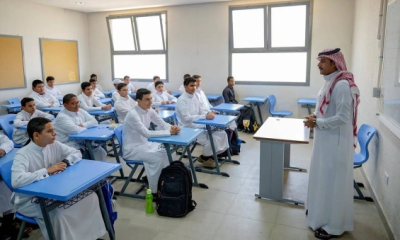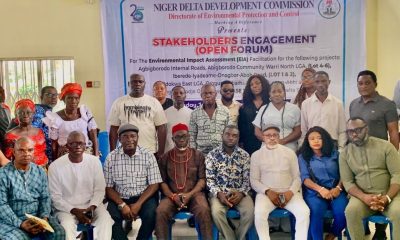NATIONAL NEWS
Stakeholders Voice Concerns Over Multinational Incursion Into Nigerian Meat Production

Stakeholders from civil society, research institutions, and international organisations have expressed deep concern over the increasing presence of multinational industrial farming corporations in Nigeria’s meat production sector.
They warn of potentially severe consequences for food sovereignty, public health, and the environment.
These concerns were raised during a media workshop organized by the Health of Mother Earth Foundation (HOMEF) in Abuja on Thursday.
Participants examined the implications of industrial-scale animal agriculture on local communities and Nigeria’s food system.
Speaking at the workshop, Joyce Okeogene Brown, Director of Programmes at HOMEF, highlighted that multinational corporations, such as JBS, are acquiring vast expanses of land in Nigeria.
She cited Niger State’s offer of 1.2 million hectares as an example, warning that such acquisitions threaten to displace local farmers and pastoralists, who are currently essential to national food production.
“Industrial farming projects often lead to the loss of grazing and farmland for local communities. Much of the meat produced is destined for export, not to meet local food needs,” Brown noted.
She further stated that a study presented by HIDA Resource Centre revealed that communities in Nassarawa, Kaduna, and Benue States are not benefiting from promised employment opportunities.
Instead, locals are often restricted to menial jobs, while skilled positions are filled by outsiders. The report also documented cases of farmland loss, water contamination, and chemical pollution linked to industrial farming practices.
Brown emphasised that Nigeria must prioritize its smallholder farmers, who currently produce over 70 percent of the nation’s food. “Rather than ceding control of our food system to foreign corporations driven by profit, the government should strengthen local farmers who are already feeding the nation,” she asserted.
Adding a global perspective, Dr. Patrick Mwinde of World Animal Protection warned of rising antimicrobial resistance linked to industrial livestock systems, which heavily rely on antibiotics.
He stressed that, “Currently, 1.27 million people die annually from untreatable infections. Without urgent action, this number could reach 10 million by 2050.”
Mwinde also noted that industrial farms rely heavily on herbicides and fertilizers that pollute water bodies and soil, leaving neighboring communities vulnerable to toxic runoff.
“These companies externalize their costs, maximizing profit while communities pay the price with their health and environment,” he cautioned.
Mariann Bassey Olsson, Coordinator of the Food Sovereignty Programme for Nigeria and Africa at Friends of the Earth, underscored the difference between food security and food sovereignty, insisting that the latter is Nigeria’s only path to sustainable farming.
“Food sovereignty means Nigerians should eat what is locally sourced and produced, in the quality and quantity they desire, not just any food,” she explained.
She argued that Nigeria can not only feed itself but also Africa and the world, provided the government invests in infrastructure, protects farmers from insecurity, and supports small-scale agriculture.
The stakeholders recommended that the government:
Protect smallholder farmers and livestock producers who feed the majority of Nigerians.
Halt large-scale land concessions to foreign corporations.
Invest in rural infrastructure and security to enable farmers to expand production.
Regulate against environmental degradation and ensure polluters bear the cost of cleanup.
They also stressed that Nigeria’s long-term food sovereignty depends on empowering its farmers, not outsourcing food production to corporations whose primary interest is profit.
-
CRIME4 years ago
PSC Dismisses DCP Abba Kyari, To Be Prosecuted Over Alleged $1.1m Fraud
-
FEATURED4 years ago
2022 Will Brighten Possibility Of Osinbajo Presidency, Says TPP
-
FEATURED2 years ago
Buhari’s Ministers, CEOs Should Be Held Accountable Along With Emefiele, Says Timi Frank
-
BUSINESS & ECONOMY2 years ago
Oyedemi Reigns As 2023’s Real Estate Humanitarian Of The Year
-
SPORTS2 years ago
BREAKING: Jürgen Klopp Quits Liverpool As Manager At End Of Season
-
SPORTS2 years ago
Could Liverpool Afford Kylian Mbappe For €200 million? Wages, Transfer Fee
-
ENTERTAINMENT2 years ago
Veteran Nigerian Musician, Basil Akalonu Dies At 72
-
FEATURED2 years ago
Tribunal Judgement: Peter Obi Warns Of Vanishing Electoral Jurisprudence, Heads To Supreme Court
-
BUSINESS & ECONOMY2 years ago
Oyedemi Bags ‘Next Bulls Award’ As BusinessDay Celebrates Top 25 CEOs/ Business Leaders
-
FEATURED4 years ago
2023 Presidency: South East PDP Aspirants Unite, Demand Party Ticket For Zone



































